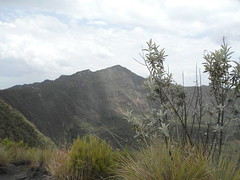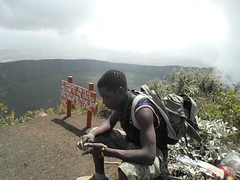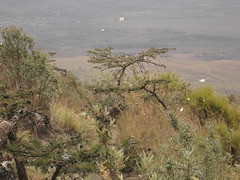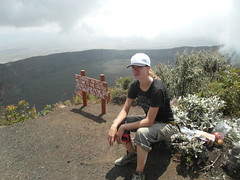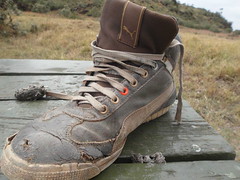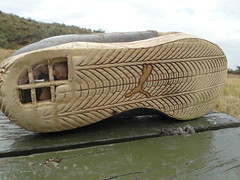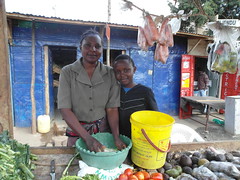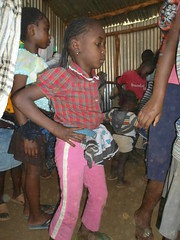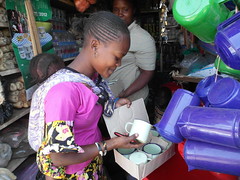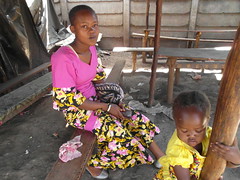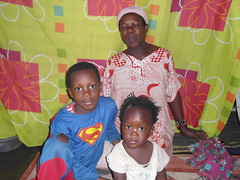My days in
Kenya, for now, have come to an end. I write this with sadness, though am happy
to think about how I spent my time in Kenya: the friends I have made, the
experiences I have had, the knowledge I obtained and the generosity and
kindness emanating from countless souls. My last few weeks in Kenya were crazy
busy as I was trying to wrap up projects and tie up loose ends before leaving
the promised land. Though one cannot completely tie up loose ends as the work
is continuous, Jah Works never ceases.
I spent my
last weekend over at the Rasta farm in Maragua. I arrived on a Sunday and spent
the whole day at the market with Ital Wandutu. Though there wasn't much
movement in terms of sales, it was good to see the community interaction. I was
also awarded the privilege of a drunk follower. He didn’t want to leave my side
until he got paid. Apparently speaking more than one word to a foreigner
provides ample reason for reward. Lucky for me, Ital Wandutu burned that fire
(aka reemed him out). The next day we spent the day at the farm and
transplanted avocado seedlings from the nursery to paper bags awaiting
planting. The rains have now come to Maragua and we expect another fruitful
season. I know they will continue to do good works - I will keep updating on my
brothers progress ... onward and upward, from Kibera to Maragua to South Africa
- good things are happening here.
 |
| Ital Wandutu |
I should
say a word or two about my close friend, Ras Githaka, founding member of
Shiriki (though he wouldn't like it put that way). He was my first contact in
Kenya and encouraged me to come out and volunteer. I have worked very closely
with him over this last year, and he has been an immense source of information,
knowledge and wisdom. In fact, he was always my go-to person should I have a
crisis (in which there were a few) or needed quick advice. He was also with me
in Kitui for the month I lived on the farm. If anyone wants to know anything
about NGOs, agriculture, networking, Africa or African history, Ras Githaka is
an encyclopedia of knowledge and one of the most articulate people I have known
- thanks for all friend.
 |
| Ras Githaka on a treadle pump in Kitui |
Next group:
I wanted to spend substantial time with my women's group before leaving. They
call themselves the Kibera Ladies. I tried to convince them to choose another
name, but they could not be swayed, Kibera Ladies it is. Last post I talked
about how we were brainstorming ideas for small business income generation. I
was eager to get them started on a project before I left and in doing so, I
probably rushed them too much. Teaching a group research and data gathering
skills is not something that can be accomplished in a few short weeks. Nonetheless,
there were three prevailing ideas that emanated positively with the group:
making soap, making charcoal briquettes and owning a cereal shop. Making soap
was the idea of member Rosinah. It is cheap to make soap, and you don’t need a
lot of space for manufacturing. Unfortunately Rosinah did not gather the
necessary information for the methodology needed for soap making before I left.
Nonetheless, I have communicated with her since being home and the woman are
making soap! The cereal store was another curious idea that group member Janet
had. The downside to starting a cereal store is that it requires substantial
capital start-up costs. I suggested to the group that they start on a cheaper
business and once the funds are in place, to go forward with a cereal shop.
They thought this was a good idea.
 |
| Lucy and Maureen |
Now for the
third idea: charcoal briquettes. I have long been interested in providing an
environmentally friendly alternative to the charcoal that everyone uses for
cooking in Kibera. The problem with charcoal is that it is destroying Kenya's
forests and eco-systems as people chop down trees and burn them as a means for
providing income. Most of this happens illegally and people chop down the
trees, burn them, and sell them to middle men buyers who transport them to the
major cities. There are many alternatives to charcoal, such as manufacturing
charcoal briquettes using agricultural by-products. At the Toi market in
Kibera, there is an abundance of agricultural waste that is thrown out. This
ranges from rotten fruits, vegetables, banana peels, leaves, sugar cane, corn
husks, etc... a goldmine! We found a kibanda (stall) to rent in Kibera, near
Toi market, where the women could manufacture or sell whatever they desired and
agricultural products were close on hand.
 |
| Toi Market |
As I was
eager to start making charcoal briquettes, me and Lucy, one of my members,
spent a few hours digging and hunting through the garbage in Toi. Though not
all the members were sold on digging through garbage to make charcoal
briquettes, I did have a couple members who were on board. This must have
looked a bit bizarre, a "muzungu" (white person) digging through the
garbage at the biggest market in the slums. Luckily there was an abundance of
sugarcane bagasse right on the surface which we collected and transported to
our kibanda. We also managed to find people that were throwing out banana
peels, so took a whole ghunia (sack) of that. We found furniture stores who
sold us a ghunia of sawdust for one dollar. Dirty and tired, we had a nice
assortment of bi-products to try out. Covered in Kibera garbage, I walked away
tired, dirty, but satisfied.
I drew up a
design of the type of machinery that was needed to make the briquettes to a
local welder in Dagoretti. It involved making a hand-held cylinder with a
removable lid that could be pounded by a hammer (or in my case a rock) to make
a solid briquette. You put your products inside the cylinder and then pound the
lid down on top of it to make a nice round briquette. I then went to our
kibanda in Kibera to experiment on making briquettes using sawdust and rotten
bananas and peels. As I worked away, my local Kibera community members came by
to see what I was up to. One response I particularly remember was: "well
muzungu - you are trying..." Not sure about the succeeding part, but trying
I was.
The
briquettes need a couple of weeks to dry before you can cook with them. Also,
it is the rainy season at the moment, so drying may take even longer.
Unfortunately I had to leave before we could try to cook with the briquettes,
but I know the kibanda will be awaiting when I return. Another method that can
be used to make briquettes involves burning sugarcane bagasse and corn husks
using an oil drum strategically cut with small holes in the bottom and a big
hole in the top. I researched the procedure and equipment needed for this
project and went to my right hand man: Shuba, to see where I could obtain the
supplies. There is a large market downtown where one can purchase oil drums - I
went downtown, bought an oil drum, got it strapped to the roof of a Kibera
matatu, and went to deliver the goods.
In Kibera I
found a welder who was able to cut the holes and make a lid. Though we did not
get to start burning before I left, I know the oil drum will be ready and
waiting for me when I return. Additionally, the women can begin to experiment
with burning the agricultural by-products at anytime to make a charcoal dust.
(though I have doubts they will begin this process before my return).
Nonetheless, I also managed to contact some different universities already
engaged in this procedure with different groups in developing countries. They
are willing to partner with us and I look forward to following through and
working with them when I am back in Kenya. Here is a demonstration video that I
found with a university in the US which I corresponded with. If interested in
charcoal briquettes, check it out (cool video) :
As for
Soweto academy, I was too scared to go back to that part of Kibera after being
chased by gunpoint by the youth gang. They knew who I was and what I looked
like and I know they were still looking for us. I figured if I needed to go
back there I would bring some serious security with me. Nonetheless, I have
made several contacts in Dagoretti who are willing to buy their water. Now it
is up to them to follow through and maintain those customers. I would still
like to keep looking for donors for the computer proposal back in Canada though
- I think I need a bit of God's help to find the right sponsors on this one.
 |
| Shuba and Purity |
I am
desperately going to miss some of the very flamboyant characters I have come to
know and love. Walking through Dagoretti as matatus fly by, Shuba yells out:
"Jah Will, get in...." Running and jumping inside the moving vehicle
I hear a passenger say something something Mzungu. Always my defenders, the
dagoretti youth burn fire "Yeye si mzungu!" (She is not a foreigner).
The youth have told me "Jah Wil, your skin may be brown, but your heart is
black." While there are obvious differences between my Kenyan brothers and
sisters and me, Kenya has become HOME.
Speaking of flamboyant youths, here is a fun project I
helped a local youth with. Jah Warrior, whom I have mentioned before, the
aspiring artist and musician who is constantly painting, drawing, writing movie
scripts and making music. I filmed a music video of him performing his song
"bedroom gully" in Kawangware. The song is about the wealthy
businessmen and politicians of Kenya who exploit the young women growing up in
poverty. There is something surreal about filming music videos in the ghetto.
As I was filming in this small little video rental studio with the song blaring
in the background, people were walking by, children dancing as they heard the
music, I remember thinking: is this real? Am I really here ... how PRIVILEDGED
am I that I get to experience this complete other world. Thanks to JAH for
providing the bridge. Anyways, this video still needs some editing, but here is
a draft of his work.
To keep my
foot in the Kenyan door, as I previously mentioned, I need to come up with some
methods for generating income. One idea that I am investigating involves buying
land. As urbanization increases at a rapid rate in Nairobi, so does the value
of land. I am particularly interested in buying land close to Nairobi so that I
can potentially live on the outskirts of the city and commute to the town. In
addition, I am interested in agriculture and having a small farm. I was not
able to buy land before I left, though am trying to maintain some of those
contacts to buy land when I return.
In
addition, we bought a matatu. Oh yes, those crazy Nissan vans pimped out to the
nines with drivers chewing miraa (plant stimulant) and crazy conductors hanging
out the door fighting eachother to convince one more passenger to come inside.
Matatus are quite a cultural item in Nairobi, they blare music (usually reggae)
often come equipped with a TV screen (in which music videos are playing) and
sometimes have Christmas lights flashing on and off. I shall continue to report
on how this initiative is going, or not going.
The day
that I have been dreading, April 19th, came far too quickly. I remember sitting
in a bus driving through Kibera with tears in my eyes. I see all these animated
people, and the truth is, their lives are not easy, but still, there is such a
spirit of energy and LIFE here. Yes, this is combined with burning garbage,
sewage trenches, and as already mentioned, a high degree of danger, but also
there is music, community, a sense of collective responsibility, and the most
beautiful land and people one could ever hope to see.
 |
| Some of my Dagoretti youth |
It was not
fun packing up all my belongings to leave though I was overwhelmed and blessed
by the number of people who stopped by or called to say goodbye. In fact, there
was a crowd of about fifteen youth hanging out by the road outside my gate
which included Jah Warrior, Rajab, Mjomba, Willy Wonder from my Seti CBO and
many other youth I have gotten to know in Dago. This community has meant so
much to me in these last 6 months, leaving... SUCKS.
After
saying goodbye to Dagoretti, I head to Kibera to say goodbye to Costanzia, the
Kibera Ladies and Shiriki. First thing, we meet Costanzia who has been
patiently waiting for me at her kibanda. She gives me about 15 chapatis as she
wants my entire family to try her chapatis. The generosity and sincerity of
this beautiful women is overhwleming. Unfortunately, since being home, I have
been able to communicate with everyone except for Costanzia, I have hope she is
doing well and I will keep trying to get her.
Next stop:
the rasta foundation. It is 8:30 pm and I walk into the Haile Selassie
Foundation. Everyone is surprised to see me, they thought I had aleady left.
Ras Benaiya, Ras Faya Ng'ang'a, Ras Maruri and Ras Makoau are all there. The
thing about the Rasta livity that I love, is their complete awareness of being
conscientious in every aspect of their life, they have taught me so much about
meaningful living. Ras Benaiya walks me back to the road after saying my
goodbyes. I have worked closely with him on many projects and he will be our
Shiriki representative at the South Africa conference. Ras Benaiaya is fairly
small in stature but speaks with incredible authority, truth and burning fire.
 |
| Ras Benaiaya, Sara and ME (with head covered) |
Final stop,
my women's group. This group was a tough one to leave because they have barely
gotten started. I constantly kept thinking, how can I leave these women?
Nonetheless, they will be okay without me. And, since being home, we have
managed to stay in touch, Rosinah keeps me updated on their progress. I am
praying for them, I will continue to encourage them, and when I return, will be
a present source of support for them should they need it! (I wish I had some
better pictures of them, but unfortunately my camera broke my last month in
Kenya).
I never
would have thought I could have had the experiences that I have had. This year
has been a crazy amazing ride - and is not over. Though I am back in Canada
now, I know I will be returning to Zion. And when I do, I will be there to
stay.














